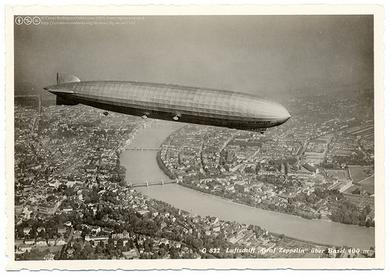|
A movie totally worth watching: Around the World by Zeppelin, a semi-documentary of a multi-week 1929 zeppelin flight. Originally a Dutch production titled “Farewell”, the BBC Channel 4 version in English (and on Youtube) is just terrific. What makes the film so marvelous is how much primary film footage they were able to use. The multi-week journal was a press event (funded by William Randolph Hearst) so most of the passengers on board were journalists. Including at least two film cameras. Really amazing to see all this vintage aviation, engineering, and socializing. Another thing that makes the film terrific is the storytelling, drawing most of its narrative from diaries kept by Lady Grace Drummond-Hay. She was a journalist with a fairly sharp eye and pen and her story makes for a nice structure for the trip. Beware the film is partly fiction; some of the events depicted (like an unlikely mid-Pacific repair) did not actually happen. The story itself is just amazing, the history of airships. The Graf Zeppelin comes from a parallel Earth, a time when elegant dirigibles sailed the skies like cruise ships and navy aircraft carriers were airborne. This actually happened, lovely to see it play out in a film. The Graf Zeppelin company succeeded in operating a passenger service for a few years before improving airplane technology and the looming war made airship success unlikely. Not to mention the Hindenburg disaster. There still is a German company operating zeppelins. I flew in the Airship Ventures craft a couple of years ago in the Bay Area, but sadly that company didn’t make it. I love the phrase between the thought and the act. It summarizes a slightly mystical experience of humanity, the difference between willing to do something and actually doing it. It comes up in all sorts of contexts. In twitch games it explains the value of better UI for allowing the player to do what they intend (as in League of Legends quick casting). In general human affairs it describes being effective. You may think of a great product idea but ideas alone are worthless; it’s the implementation that has value. The phrase also has a second meaning it ethics, the difference between thinking of doing something vs. actually doing it. I think the best known use of this phrase is slightly different, coming from TS Eliot’s The Hollow Men. Between the idea I don’t like the use of “motion” though, since in so many cases the motion is the act. The earliest use of the phrase “between the thought and the act” I could find occurs a few years before the Eliot poem, on page 242 of the 1917 book Educational Psychology by Kate Gordon. I have no idea if that book had much reach though. I wonder if the phrase comes from an older idea, maybe Greek philosophy? Every time I think of the phrase, I hear the Crime & The City Solution song The Adversary. Update: Douwe tells me of the 1910 Dutch
poem Het Huwelijk by Belgian poet Willem Elsschot (English translation),
which contains the phrase "tussen droom en daad",
roughly the same meaning.
Update 2: my old gamer buddy Hronk wrote
to tell me that this concept shows up in Shakespeare's Julius Caesar,
Act 2 Scene 1,
Brutus reflecting on the turmoil of making a decision.
Since Cassius first did whet me against Caesar, |
||

